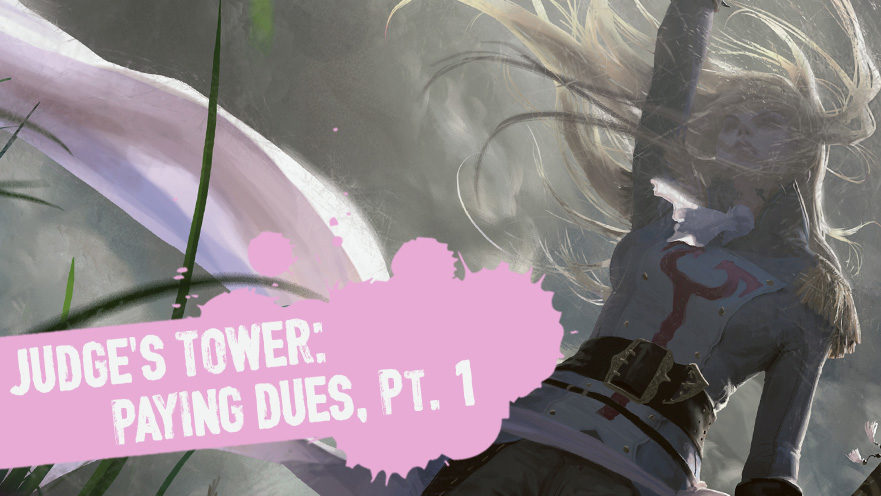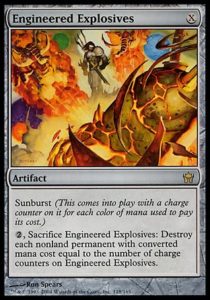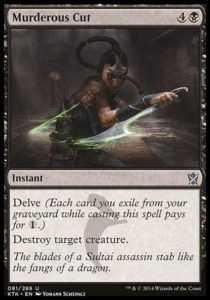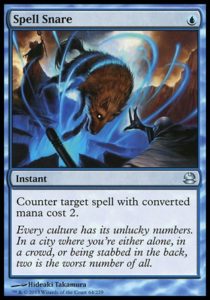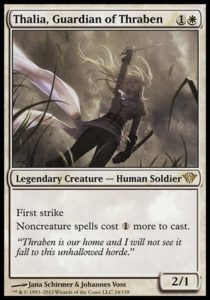 Like any other game or hobby, Magic requires that you pay some dues before you can really get the most out of it. There’s a decently high barrier to entry, as even learning the basic rules of the game can seem daunting when you’re just starting out. But once you’ve put in the time and effort required to really dig into the nuances of the game, the results can be incredibly rewarding.
Like any other game or hobby, Magic requires that you pay some dues before you can really get the most out of it. There’s a decently high barrier to entry, as even learning the basic rules of the game can seem daunting when you’re just starting out. But once you’ve put in the time and effort required to really dig into the nuances of the game, the results can be incredibly rewarding.
Or at the very least, super annoying to your opponents. Which I find highly rewarding.
Today, we’re going to look at paying costs, specifically as that relates to Death & Taxes’ favorite tax collector, Thalia, Guardian of Thraben. A 2/1 first striker for 1W is already pretty aggressive, but no one would look twice at the card without that other line of text: “Noncreature spells cost 1 more to cast.” Those seven words made her into one of the premier reasons to play a Death & Taxes deck, and why she has seen play in every format in which she’s legal.
Thalia’s rules text can also cause a bit of confusion. Let’s look at some common scenarios, and you’ll see what I mean.
(Note: Everything we’re about to discuss applies to anything directly adding to the cost of a spell – Vryn Wingmare, Sphere of Resistance, Thorn of Amethyst, etc. Trinisphere is its own weird rules conundrum, and we’ll be addressing it in Part 2 of this article.)
SCENARIO 1
Abel is playing Newt in a game of Modern. Newt has a Thalia, Guardian of Thraben in play, along with several Monk tokens from a Monastery Mentor that has recently been killed. Abel wants to play an Engineered Explosives for zero, but must pay one for the Thalia tax. Abel taps a Steam Vents, and announces Engineered Explosives. How many counters will E.E. have when it resolves?
ANSWER
Engineered Explosives will have one counter on it. Even though Abel set X as zero, he still used colored mana to pay for the spell to cover the Thalia tax. From the Comprehensive Rules for Sunburst:
“702.43b – Sunburst applies only as the spell is resolving and only if one or more colored mana was spent on its costs. Mana paid for additional or alternative costs applies.”
Abel will need to find another answer for those pesky Monks.
SCENARIO 2
Abel and Newt are still playing. Thalia is still on board, and Abel is getting tired of having her around. Abel only has access to one black mana, but he has five cards in his graveyard, so he casts Murderous Cut targeting Thalia. Can he pay for the spell?
ANSWER
Yup! Delve can be used to pay additional costs. Once more from the Rules:
“702.65b – The delve ability isn’t an additional or alternative cost and applies only after the total cost of the spell with delve is determined.”
We’ve gone over the steps of resolving spells and abilities before, now let’s take a quick look at what goes into casting or activating spells or abilities:
- Announce the spell/ability, and put it on the stack. Pretty straightforward.
- Choose modes; determine X values; determine whether any alternative, additional, or special costs of the spell/ability will be used; and how hybrid will be paid. Essentially, figure out what the spell is doing, and how it’s going to do it.
- Choose targets. Also pretty straightforward.
- Determine costs and activate mana abilities. A lot of the time, players will tap their mana and whatnot before this point – this is fine.
- Pay all costs.
If, at any point during this process, the players determine that the spell can’t be cast for any reason (illegal targets, incorrect mana, whatever), the game backs itself up and resumes before the spell or ability was announced – you don’t lose the spell, and your mana isn’t gone.
Steps 4 and 5 are the most relevant ones here. When we go to determine costs, that’s when we add the Thalia tax to Murderous Cut. Since 702.65b boils down to “Delve is just another way to pay the total cost of the spell,” Abel is going to be able to Delve all five cards out of his graveyard to pay for the Thalia tax.
For the record, since it also comes up and is in the same theoretical neighborhood, Convoke works the same way. If Abel were to try to cast Chord of Calling with X equal to 3, he could tap three green mana and four creatures to pay for the Thalia tax. Convoke’s relevant rules wording is the same as Delve’s – it’s a way to pay costs after the total cost has been determined.
Alright, one more before we call it a day.
SCENARIO 3
Newt has managed to land another Thalia, much to Abel’s annoyance. On Abel’s end step, Newt pays two mana to try and Path to Exile Abel’s Tasigur, the Golden Fang. Abel thinks for minute, then pays two mana of his own to try and Spell Snare the Path to Exile. What happens?
ANSWER
Even though Newt paid two mana for Path because of the Thalia tax, Spell Snare still can’t counter it. In fact, it can’t even be cast in this situation, as Path is an illegal target. Spell Snare only cares about the converted mana cost of the spell it’s trying to counter, not what was paid to cast the spell. The converted mana cost of any card is always what is printed in the top right corner (or top left, if we’re counting Future Sight card frames). Tasigur is going to get exiled unless Abel has a different way to stop Path.
And that’ll do it for this installment of Judge’s Tower. Tune in next time when we talk about another annoying, mana-hungry creature: Leonin Arbiter.

Chris is the Marketing Communications Coordinator (and editor of the blog) at Card Kingdom. He would like to apologize to his son for not holding onto more cards from when he first started playing, as that likely would have paid for college. He enjoys pretty much all formats of Magic, but usually ends up playing decks that make other people dislike playing those formats with him.

